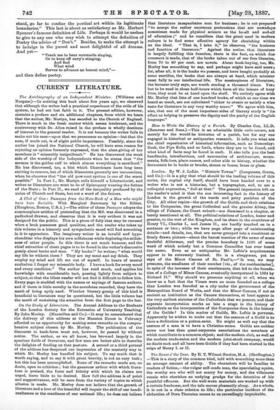On the Study of Literature. The Annual Address to the
Students of the London Society for the Extension of University Teaching. By John Morley. (Macmillan and Co.)—It may be remembered that the delivery of this address at the Mansion House in February afforded us an opportunity for making some remarks on the compre- hensive subject chosen by Mr. Morley. The publication of the discourse in book-form must not, however, be passed by without notice. The author, as we all know, has browsed largely in the spacious fields of literature, and few men are better able to describe the delights of feeding on that pasture. A second or a third perusal of the address has deepened oar impression of the masterly way in which Mr. Morley has handled his subject. To say much that is worth saying, and to say it with great brevity, is not an easy task ; but this has been accomplished. Some of the remarks made are, no doubt, open to criticism ; bat the generous ardour with which litera- ture is praised, the force and felicity with which its claims are urged, leave little to be desired. How full the address is of point and suggestiveness, will be seen from the variety of topics to which allusion is made. Mr. Morley does not believe that the growth of literature and a love of the beautiful will impair the skill of our handi- craftsmen or the manliness of our national life ; he does not believe
that literature incapacitates men for business ; he is not prepared "to accept the rather enormous pretensions that are nowadays sometimes made for physical science as the be-all and end-all of education ;" and he considers that the great need in modern culture is to find some effective agency for cherishing within us the ideal. "That is, I take it," he observes, "the business and function of literature." Against the notion that literature is largely fulfilling this function, there is the fact, on whioh due comment is made, that of the books taken out of our free libraries,. from 70 to 80 per cent. are novels. About hook-haying, too, Mr. Morley has something to say, and perhaps might have said more; for, after all, it is the books we possess, and have bought probably at some sacrifice, the books that are always at hand, which minister most fully to our intellectual life. The masterpieces of literatare„ the lecturer.truly says, are worth reading a thousand times. Yes; but to be read in those half-hours which form all the leisure of busy lives, they must be at hand upon the shelf. We entirely agree with Mr. Morley that lists of one hundred books, of which at one time we heard so much, are not calculated "either to create or satisfy a wise teats for literature in any very worthy sense." We agree with him, also, that one of the most important sidee of literary study is "its effect as helping to preserve the dignity and the purity of the English language."


































 Previous page
Previous page